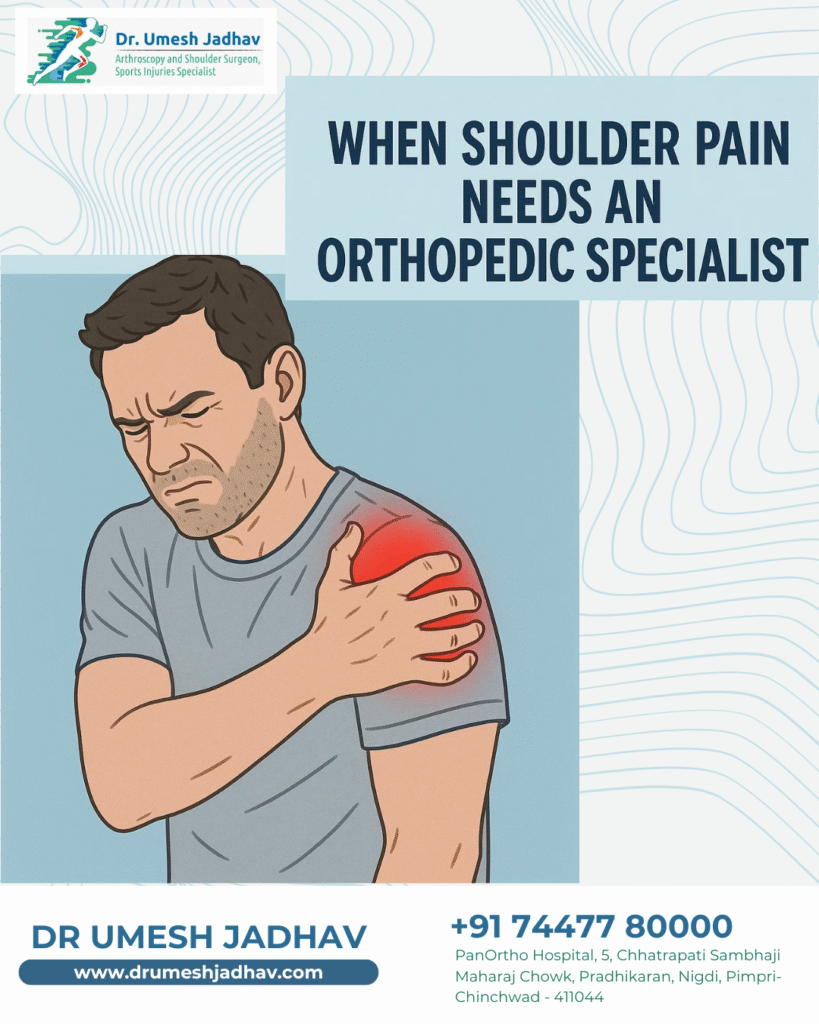Shoulder pain is a common issue that many people experience at some point in life. It may be caused by poor posture, overuse, or an underlying condition. While mild pain can often be managed with rest and home care, persistent or severe pain should never be ignored.
In this blog, we explore when shoulder pain may be a sign of a more serious issue and why it’s important to consult an Orthopedic Specialist. You’ll also learn about common causes and available treatment options to help you find relief and restore mobility.
Common Causes of Shoulder Pain
Your shoulder is a complex joint made up of muscles, tendons, ligaments, and bones. Pain can result from several conditions, including:
-
Frozen Shoulder (Adhesive Capsulitis)
-
Shoulder Bursitis or Tendinitis
-
Arthritis in the Shoulder Joint
-
Shoulder Impingement Syndrome
-
Fractures or Dislocation
-
Repetitive Strain Injuries (often from sports or physical work)
Signs You Need to See an Orthopedic Specialist
While occasional discomfort may resolve on its own, here are some signs that your shoulder pain needs expert evaluation:
Pain Lasting More Than a Few Days:
If your shoulder pain doesn’t improve within 5–7 days despite rest and home remedies, it’s time to see an orthopedic specialist.
Limited Range of Motion:
If you struggle to lift your arm, rotate your shoulder, or perform daily tasks like dressing or combing hair, it could be a sign of frozen shoulder or rotator cuff problems.
Pain While Sleeping:
Pain that worsens at night or prevents you from sleeping comfortably, especially when lying on the affected side, may indicate inflammation or internal joint damage.
Swelling, Redness, or Warmth:
These symptoms can be signs of infection or inflammation and need immediate medical attention.
Weakness or Numbness in the Arm:
If your shoulder pain is accompanied by arm weakness or tingling, it could point to nerve involvement or a more serious injury.
History of Trauma or Injury:
If your shoulder pain started after a fall, sports injury, or accident, consult an orthopedic doctor to rule out fractures, dislocations, or ligament damage.
What to Expect from an Orthopedic Consultation
When you visit Dr. Umesh Jadhav, an experienced shoulder pain specialist in Nigdi, PCMC, he will perform:
-
A detailed physical examination
-
Assessment of your shoulder’s range of motion
-
Imaging tests like X-ray, MRI, or ultrasound (if needed)
-
A personalized treatment plan based on the cause and severity of your pain
Treatment Options for Shoulder Pain
Depending on your diagnosis, may recommend:
-
Medications to reduce pain and inflammation
-
Physiotherapy to improve mobility and strengthen muscles
-
Corticosteroid Injections for pain relief in cases like frozen shoulder
-
Minimally Invasive Surgery in severe cases, such as torn rotator cuff or impingement
When to See an Orthopedic Specialist
If you’re experiencing persistent shoulder pain, limited mobility, weakness, or discomfort that interferes with daily activities, it may be time to consult an orthopedic specialist. Pain that doesn’t improve with rest, medication, or physical therapy could indicate underlying issues like rotator cuff injuries, frozen shoulder, or arthritis. An orthopedic specialist can diagnose the root cause and guide you toward effective treatment—whether conservative or surgical. Early intervention often leads to better outcomes and faster recovery.
Conclusion
Shoulder pain, if ignored, can progress to conditions like frozen shoulder or tendon tears, leading to long-term damage. For expert care, consult Dr. Umesh Jadhav, a leading Orthopedic and Frozen Shoulder Specialist in Nigdi, PCMC. Take the first step toward lasting relief and restored mobility—book your consultation today.

